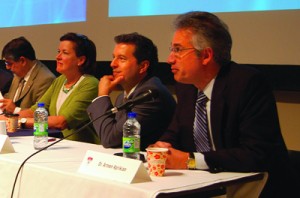By Vassilios Papadopoulos, Armen Aprikian, Bartha Maria Knoppers, Martin Leblanc, Gwendolyn Andrews Nacos, Tommy Nilsson, Louise Pilote
Health IT is evolving in tandem with genomic and proteomic science: fields that are making personalized medicine a reality. Dr. Vassilios Papadopoulos, Director of the Research Institute of the MUHC, chaired a roundtable discussion of clinicians, patients, researchers and drug developers to look at how health care is likely to change as a result of these new technologies. Around the table were Dr. Armen Aprikian, Chief, Cancer Care Mission, MUHC; Prof. Bartha Knoppers, Director, Centre of Genomics and Policy, McGill University; Mr. Martin Leblanc, President and CEO, Caprion Proteomics; Ms. Gwen Nacos, Founder, Cedars CanSupport, Cedars Cancer Institute; Dr. Tommy Nilsson, Director, Proteomics and Systems Medicine, Research Institute of the MUHC, and Dr. Louise Pilote, Director, Division of General Internal Medicine, MUHC. —Report from a roundtable discussion held as part of the 2010 program of the MUHC-ISAI
Chair’s Introduction
In the 20th century, we learned how lifestyle affects health. In the last decade, we have experienced a revolution in medicine with the complete characterization of the human genome. The Genome Map took 12 years to complete at a cost of $12 billion. In 2007, the full genotyping of Dr. James Watson, who discovered DNA, cost $1 million. Today’s average is $65,000 and international competition is further reducing costs, potentially as low as $1,000.
This has led to the concept of personalized medicine, which is essentially the use of the information from a person’s genotype to select the most appropriate therapy for a disease or condition. Personalized medicine has started to gain traction in oncology, particularly in breast cancer, where genetic markers allow us to predict quite accurately the type of cancer, its progression and its response to a prescribed therapy. We are moving away from the era of ‘magic bullets’ where the same drug is administered to everyone.
The approach of the future will be much more individualized: every patient will have his/her own prescription for a disease based on his/her genetic profile. We are also moving away from merely treating disease to maintaining health — from personalized medicine to personalized health management (PHM). PHM aims to take advantage of the molecular understanding of disease gained by looking at a person’s unique clinical, genomic, genetic and environmental profile. This approach shifts the focus to prevention for those who are still healthy or at the very early stages of disease. Some regard prevention as too expensive, but it may be the solution to spiralling healthcare costs.
While genomics provided the alphabet with which to read individual characteristics, additional information gleaned from proteins, metabolites and detailed imaging allows us to read whole words and put a complete description on a smart card. The patient can bring the card to the physician, who sees the problems and determines what can be done based on the individual’s profile. These technologies exist today, though they have yet to be widely applied.
The policy and infrastructure framework within which personalized medicine evolves will have a very significant impact on patient care and personalized health management in 2020.
Betty 2020
Dr. Papadopoulos presented two scenarios of a hypothetical case to illustrate how genomics and proteomics might affect patient care in 2020.
Scenario #1
In the optimistic scenario, Betty turns 18 in 2020 and completes a detailed family history profile. She learns that a number of family members have presented with early-onset heart disease. Betty consults her physician, who suggests a full genotyping for $1,000. Worried about possible restrictions by her insurer if something is detected, she inquires about the risk of genetic discrimination. With the knowledge that federal legislation has banned genetic discrimination, she proceeds and discovers that she has three gene variants that well-validated studies have shown increase five-fold her risk of having a heart attack. She and her physician design a prevention program based on diet, exercise and medication tailored to her genetic profile. Betty does well until age 75, when she develops left-arm pain. She thinks it is due to gardening, but her physician knows her high-risk status and diagnoses acute myocardial infarction. Her doctor looks back at her genotype, finds the drug(s) that are best suited to treat her profile and she continues to live in good health well into the 22nd century.
Scenario #2
In a more pessimistic scenario, Betty does not know her family history. She is offered genotyping, but after watching her brother lose his health insurance from this type of information, declines. Betty maintains an unhealthy diet, gains weight and develops hypertension. While tests to predict which drug would be most effective for Betty have been proposed, these have never been validated and are not reimbursed. Betty’s hypertension is treated with a drug that causes hypersensitivity reaction, so she stops treatment. After two years of uncontrolled hypertension, a 45-year-old Betty develops left-arm pain. Her physician, unaware of her genetic predisposition, assumes this is a musculoskeletal problem related to gardening and prescribes rest. Betty returns to the ER the next day in cardiogenic shock. The absence of her genotype profile prevents an optimal choice of therapy and Betty dies in the ER.
Discussion
Dr. Papadopoulos asked roundtable participants to think about how we might start to address some of the issues that will make the difference between the optimistic and pessimistic scenarios for medicine in 2020.
Will Canadians be protected from discrimination on the basis of their genetic information?
Prof. Knoppers: The assurance that our data is secure and will not be used against us by insurance companies and others is not there. Despite that, people display tremendous interest in genetic information for both genealogical and health reasons. They are not scared of their genes and their family history. Research ethics committees, however, are very leery of research protocols that involve people learning about diseases they may have and do not look upon these favourably. They are fostering what I call genetic ‘exceptionalism’ — the idea that genetic information is not normal ‘human condition’ information.
Will personalized medicine change physician practice?
Dr. Pilote: Genomic information is just one more piece of data physicians will use in the course of treating patients. First, we need to make the data we currently collect more accessible for consultation. It is difficult for physicians today to access the results of blood tests, imaging scans and psychosocial assessments in order to make informed decisions about treatment that can help modify disease progression and prognosis. The first challenge is improving access to the information we have today. The second is knowing what to do with the new information that becomes available through genomics.
Dr. Nilsson: Will the physician become a specialist in interpreting the information from a patient’s proteome, genotype, transcriptome and metabolites that will be available within 10 years? Will we need to create a support level that translates the data into information that is meaningful to the physician? And what must we do to prepare the next generation of physicians to deal with all these new technologies and the processes around them?
There will be hundreds of parameters, some relevant, others not. In the research community right now, there is a discipline called systems biology that involves using computers to search all this complex data and extract relevant information. This will become systems medicine as data from genomics is coupled with a patient’s personal traits, such as age, gender and profession, and integrated into computer analysis. Systems expertise will support physicians in their work, but physicians will still make the judgement call. They will simply have another set of results to consult on a PDA to inform treatment decisions. But we need to build the infrastructure to make sure we have that support available.
Prof. Knoppers: I see nanotechnology and bioengineering at the point of care simplifying the endless going here for one test and there for another, and getting rid of the endless shuffling of paper records. By 2020, we will have electronic medical records organized in a translational sense, all the way from research to the family physician to the hospital.
Are we heading toward ‘faceless’ care?
Dr. Aprikian: If technology continues to improve so we can predict health problems and the effectiveness of particular drugs much better, we can see how personalized medicine could become impersonal, meaning people no longer have doctors but rather a long-term genome-based prescription. At age 20, they should have this test and at 40 they should start taking aspirin and everything will be lined up for them. We would probably need fewer doctors, as their role would be to step in when the algorithm did not fit anymore. I do not know how patients will react to that. Right now, some of them still say they would like to spend more than five minutes with me, to ask me about my kids and tell me about their vacation.
Ms. Nacos: The doctor plays a role in helping the patient muddle through all the information that he or she comes in with. Cedars CanSupport puts on several free public information lectures each year on specific cancers and at every one we ask people why they came. There are always some who saw the ad in the local newspaper and some who saw posters and flyers. But two-thirds of those in attendance are there because they received a letter signed by their doctor suggesting they attend. What the doctor tells the patient today is so important and I do not see that changing, except that patients will have more information and I think start to challenge the system to respond to their needs.
Will tests to predict an individual’s response to a drug be developed and reimbursed?
Mr. Leblanc: The average drug reimbursed by our healthcare system only has a positive impact on 40% of people who take it; 60% have no response and some suffer side effects serious enough to require a visit to the ER. That is changing as approval requirements for new drugs become more stringent. In the U.S., the FDA is demanding that companies study the comparative effectiveness of a new drug against those already on the market before seeking approval. There is also a push to reduce costs by focusing reimbursement on the 40% of patients in whom a drug can and does have an impact. This requires identifying these patients through some kind of companion diagnostic or early marker of efficacy. One of the early successes in this area is the HER-2 gene in breast cancer. We have a test that identifies patients with a much higher chance of responding to the drug Herceptin, and we can decide to prescribe it and reimburse it for this group. This is one very isolated case where objective metrics are available, but the world of prescription drugs is begging for a whole lot of new ones.
How fast can we expect to see clinically useful tools from ‘omic’ discoveries?
Mr. Leblanc: The simplistic way to develop new metrics is by accumulating hundreds or thousands of patient samples and interrogating them in a very systematic fashion using proteomics, genomics and imaging technologies to figure out what measures could actually become a validated test and influence medical practice. However, the pharmaceutical industry cannot afford to undertake independently the parallel programs to research these companion diagnostics. Nor should we really want them to. To get the full economic benefit of personalized medicine, we may not want a single company controlling the intellectual property around companion diagnostics. These should ideally serve to create a level playing field where all drugs of a same class would be subject to a same predictive marker of response. That would bring the broadest potential public health benefit out of a companion or predictive marker.
Prof. Knoppers: The regulatory bureaucracy is largely still based on classical divisions between drugs and devices. Researchers involved in new technologies are left wondering which road to go: Is regenerative medicine best suited to a device or drug model? What about nanotechnology? The classification of new technologies at the regulatory level creates incredible hurdles for researchers and the system is no longer responsive.
The other hurdle on the research side is the continued difficulty in accessing samples and data to accomplish the large studies needed to identify genetic markers. The consent forms are still just as complicated and researchers still have to go through clinical ethics committees, university ethics committees, the access commission and the Ministry before proceeding with a project. It is time to build some safe-harbour approaches based on mutual trust and recognition along with multi-centre, single-review processes.
In a growing number of U.S. hospitals, patients are notified when they come in that their ‘anonymized’ biological material will be used for research to develop more precise testing and care, unless they opt out. We need to find out whether people here would be willing to share their data and samples in a secure environment.
Dr. Aprikian: We have the technology, informatics and minds, but what industry and academia need is actual material from people. I would hope that from now until 2020, every patient who walks through the door at the MUHC provides a blood sample and completes a detailed questionnaire — all highly protected for confidentiality — so that by 2020, we have a longitudinal cohort of people and can use that databank to answer a number of questions. If we cannot get that broad database, we will have newer technology in 10 years, but we will still be asking the same questions.
Are people interested in obtaining genetic information to predict future health problems?
Ms. Nacos: Many patients would like to have their genetic information so they could better understand how to make decisions about elective surgery or other preventive treatments. Others will choose not to know. The rights of the individual patient must always be respected. In the cases of the BRCA 1 and 2 gene, I have seen patients who want to find out because there is a family history of breast cancer, while others in the same family choose not to know because the information may force them to make a painful decision about undergoing elective preventive surgery. We need to respect individual wishes.
Dr. Pilote: Aside from a few exceptions like the BRCA gene, there is not much I could do today with that information. Most of the disease prevention measures involve common sense prescriptions like exercise, not smoking and avoiding obesity. So it would not add to what I can actually do to change my prognosis. Even after years and years of work in these areas, we have a very hard time changing behaviour, whether lifestyle or adherence to medication. That whole question of how patients integrate the information we provide into their lifestyle needs to be researched as we expand toward personalized medicine.
Dr. Papadopoulos: Systems medicine is more than the genome. It brings together proteins, metabolites and everything to provide a better prediction of disease or response to medication. This is what we are talking about with the whole personalized health management approach. The genome is the component we already have available. The others are under development. The proteome for individuals is coming soon.
What impact will personalized medicine have on cost?
Dr. Papadopoulos: Could it be more expensive than the reactive medicine we use today, where we try drug after drug until something works, with the patient’s condition often growing worse until he/she requires expensive hospital care?
Dr. Aprikian: In cancer, we are spending a lot of public funds on mass screening. The return on investment from mammography, PSA or colorectal cancer screening is about a 5% to 7% reduction in mortality from these cancers. If we can develop biomarkers that enable us to identify a smaller target group for screening, the savings could be used on newer cancer treatments that are much more expensive than what we have had in the past. Many of the new drugs based on proteomic discoveries are fine-tuned for one or two targets that not every patient has. You can see how a drug that only applies to 5% of people with a given cancer may be of limited interest to industry unless the price is set quite high. For example, we have a drug for kidney cancer today based on proteomic discovery that will extend life by three months but costs $50,000.
Mr. Leblanc: The examples of breast- and prostate-cancer screening point to just how non-predictive current tests are, and how not every biomarker is a good biomarker. A biomarker that has very high sensitivity or specificity for detecting disease may be very useful and cost-effective for the healthcare system. The expensive part will be to develop and validate new tools that are far more predictive, but once we have them, they should ultimately reduce costs in the healthcare system if they are deployed appropriately.
Dr. Pilote: The uptake of some technologies — PSA is one example — occurs before they are proven to be cost-effective and useful. It makes sense to have personalized medicine and it makes sense that it will save money. However, we have to put these new technologies under the same scrutiny of technology assessment employed with other technologies. The MUHC has a longstanding history of excellence in technology assessment and can play a very important role in conducting these evaluations.
Conclusion
The future of medicine holds much promise. However, medicine in 2020 clearly depends on what we do today. Many considerations must therefore be addressed sooner rather than later, not simply by healthcare providers, but by all stakeholders, including healthy Canadians.
Of note: many people face huge obstacles in trying to change lifestyle behaviour and in adhering to treatment. Will knowing the risk factors years in advance change the outcome? What are the ethical implications of knowing a genetic risk factor for a particular disease when you may be one who never develops it despite having a predisposition? With the advent of new, costly medications, will we have to make more judgement calls on quantity vs quality of life? Just because a patient today is informed, does it make him better informed? If a new field is systems biology, what else do we need and how are we adjusting our academic programs to be prepared? How can we manage the ballooning volume of data most effectively? How can we, as healthy Canadians, become more responsible about our health?
Infrastructures (physical, equipment and medical informatics), cost containment (sustainability), outcomes (value of treatments), ethical frameworks and educational tools (for patients and healthy individuals) should therefore be further explored. On that front, there is a consensus that the MUHC should play a leadership role in the research, development, assessment and integration of the technologies that will shape medicine in 2020.












